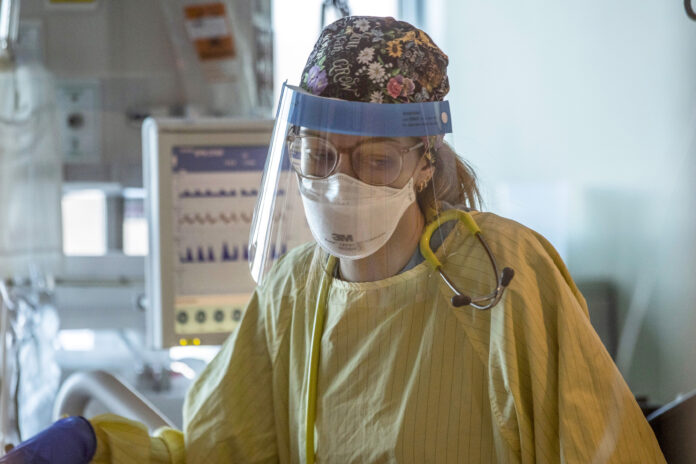At least 40 per cent of Canadians have been infected with the Omicron variant of COVID-19, according to new research compiled by Canada’s COVID-19 Immunity Task Force.
But despite this “Omicron tsunami” in Canada, as task force experts call it, emerging data shows not everyone who gets sick with COVID-19 will develop immunity from the infection.
In fact, one in every eight people who contract the virus do not develop antibodies in their blood from their illness. And children are half as likely to develop immunity from an infection, according to the data released in June.
“So forget going to some kind of ‘COVID party,’” said Dr. Catherine Hankins, a professor at McGill University in the Faculty of Medicine and co-chair of Canada’s COVID-19 Immunity Task Force.
“Infection is not a viable strategy to achieve or maintain immunity.”
This is just one of many findings from research studies funded by the COVID-19 Immunity Task Force that offer new insights into the virus that has caused a global pandemic, including how the virus is evolving and how this is affecting the immunity provided by vaccines and by infections.
The task force, made up of scientists and experts from universities and hospitals across the country, was created in April 2020 by the federal government. Its mandate is to determine the extent of COVID-19 infection in Canada, to learn about how immunity is affected by infection and to provide information to governments and decision-makers about the virus, based on data and research.
One thing that has become clear in recent months is that Omicron and its offshoot subvariants have developed a formidable ability to evade immunity — whether from vaccinations or previous infections, according to data published by the task force.
Uptick in Omicron cases this summer likely means more hospitalizations
Therefore, people who have contracted COVID-19 should not assume they’re now immune.
“We do have one in eight people that don’t show any antibodies in their blood, so they’re not responding to the vaccine. And if they get infected, we’re not seeing evidence of it… So we don’t quite know what’s going on,” Hankins said.
Related News
N.B. reports 4 deaths in new COVID-19 update as hospitalizations, cases rise
That’s why it’s important for Canadians to understand that COVID-19 hasn’t gone away and that it is mutating and re-infecting people, she added.
There’s also new data showing that people who contracted the virus before they received their first COVID-19 vaccines ended up with the strongest protection against the virus, according to research conducted by a team led by Michael Grant, professor of immunology and associate dean of biomedical sciences at Memorial University.
This is what is known as “hybrid immunity.”
His study, which began in June 2020, looked at patients who had been infected with the original strain of the virus before they were vaccinated and compared their immune response to those who received the vaccines but did not get sick.
“We saw that people who had previously been infected and then received the vaccine, they had an enormously more powerful immune response to the vaccine,” he said.
“So much so, that after the first shot of the vaccine, they had higher levels of antibodies than the naive people (who had not become ill) had after two shots of the vaccine.”
Grant’s team also found that — among patients who contracted earlier strains of the virus such as the original strain or the Delta variant — the more severe their infection was, the stronger their immune response was and vice versa. This means those who got sicker received greater protection against the virus after they recovered.
But the same is not holding true for Omicron and its subvariants, Grant said.
If an individual does develop antibodies as a result of an Omicron infection, the levels of immunity provided by that illness are quite low, which leaves them vulnerable to future or repeat infections.
“There’s general consensus that two shots and then infection with Omicron is pretty much as good as having three shots of a vaccine,” Grant said.
“But because it’s a milder infection, either because people have been vaccinated or because the virus is just less virulent, it doesn’t seem to stimulate as strong an immune response as previous infections did.”
NACI recommends COVID-19 booster shots in autumn ahead of potential wave
Overall, even though the current COVID-19 vaccines are not preventing transmission of the new variants of the virus, there is strong scientific evidence showing the vaccine does prevent severe illness and death.
The challenge for health officials going forward will be to ensure the public is aware of this and that individuals remain up-to-date with their vaccines. The research funded and compiled by the task force to date shows that immunity against COVID-19 wanes over time, Hankins said.
“I think it’s important that people understand that if you’ve had it before, you are still a sitting duck for these new variants, which don’t pay any attention to the fact you’ve had it before, and that if your immunization is lapsing, you don’t have the immunity that you had closer to when you got your vaccine,” she said.
“So it’s really important to get that booster.”
Related News
© 2022 Global News, a division of Corus Entertainment Inc.



